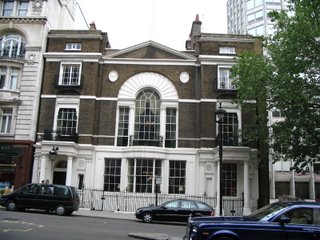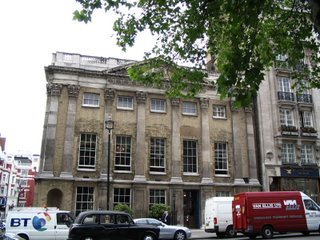I promised this on Monday, but the excitement of getting the contract for my next book quite took over the rest of my life.
Boodle. Now there is a name to conjure up an image. Portly. Large red-veined nose and definitely bald. And jolly.
Let’s us see what history says about it. But first, here is a picture of how the club looks today. Far more elegant than White’s don’t you think?

Named after its first manager, Boodle’s began in 1762 and is of course located in St. James, number 28 to be precise. It started as a political club, like many of the others, but that didn’t last long. While the Beau and Wellington and Wilberforce held memberships, it was mostly frequented by country gentlemen who came for the excellent menu and for gambling. The last very nearly goes without saying. As you can see quite clearly from the picture, it also had a famous front bow window.
Men dropped unbelievable sums of money wagering on games--- cards and dice.
Hazard was a dice game.
E.O a wheel game E.O. stood for even-odd. It was made illegal in 1745
but that did not stop the clubs.
Faro- also illegal
Whist was the forerunner of modern bridge.
These are only some of the games the gentlemen played. I will have longer article on them another time.
Brookes’s
Brooks’s rose phoenix like upon the ruins of Almack’s Club, and hoisted the Whig colors at number 60 St James Street. No bow window and to me it seems a much more solomn looking building than the other two we've looked at. Don't you just itch to peek inside. I would love to dress up as a man and slip through the hallowed portals as Caro's nemisis did in No Regrets. Now that is not very kind of me, because you will have to wait until November 2007 to find out what I mean.

It was here that Chales James Fox and other great Whigs, won and lost hundreds of thousands, frequently remaining at the table for hours.
Brooks’s, too, boasted of the name of the Prince of Wales on its roll of members, but his Royal Highness withdrew when his friends Tarleton and Payne were blackballed, and founded for himself and his friends a new club, to which his house-steward Weltzie, gave his name. Sheridan, in spite of the opposition of George Selwyn, became a member of Brooks’s, and wrote a rhymed epitaph on the founder:
“Alas! That Brooks, returned to dust,
Should pay at length the debt that we,
Averse to parchment, mortgage, trust,
Shall pay when forced—as well as he.
And die so poor, too! He whose trade
Such profit cleared by draught and deed.
Though pigeons called him murmuring Brooks,
And dipped their bills in him at need,
At length his last conveyance see,
Each witness mournful as a brother,
To think that this world’s mortgagee
Must suffer judgment in another!
Where no appeals to Courts can rest,
Reversing a supreme decree;
But each decision stands confessed
A final precedent in re.”
There are many tales of gambling by the most famous men of the day here at this club, fortunes won and lost, and debts owed to the fashionable moneylenders Howard and Gibbs, sometimes known as cent percenters. When one remembers that ordinary folk could go to debtors prison, the risk for these men was very great indeed.
With your indulgence, I will continue with my tour of the Gentlemen’s clubs, cover some of the famous ones and some of the less known.
Until next time, happy rambles.
No comments:
Post a Comment